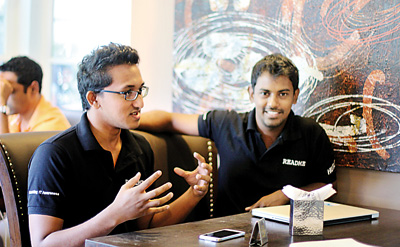The tech guys
If you’re a social media addict or technically inclined you’ve probably come across Readme.lk at some point. In operation for three years, the webpage is known today for its variety of content among the gadget-dependent for the latest in Sri Lanka’s tech scene. Growing into a full-time staff of twelve, 26 year old co-founders Andrew Jebaraj and Enosh Praveen remember busier days when the whole website was a two-man project.
It all started when Enosh wanted to “Sell boxing gloves to a nurse.” The prospect that at the other end of his degree he could “sell anything to anyone” was the sole inducement in deciding to study business and marketing. Soon after graduating from ACBT which marked the end of his formal education, it dawned on Enosh despite his enthusiasm for making a sale, a ‘predictable’ job in a ‘stable’ company wasn’t what got him excited. “I did try it,” he tells us speaking of his first job. Strangely everything from the attire to the hierarchy of the corporate sector left him feeling stifled, and out of place.
Readme wasn’t born solely out of his misfit in the corporate world. “It had a lot to do with meeting the right person, at the right time.” Andrew’s interest in everything tech was evident from school days at St. Thomas’ College Bandarawela. Completing his Degree in IT at APIIT, the two boys crossed paths at church and it didn’t take long for the mutual revelation that they had more in common than they thought. “We worked on a lot of youth projects and realized that we were on the same frequency” Enosh recalls. From random business venture ideas- a list that includes selling vegetables and starting a bar, it was however a gap in the mainstream media that got the boys’ attention. “A lot was happening in the IT industry that just wasn’t getting picked-up.”
At first glance to those not accustomed to tech-lingo Readme can sound slightly pleading, but the name carries weight to those who are fascinated by all things binary. Deciding to christen their website after the Read-me file in software which is intended to be used as a manual, the boys felt “It’s what we wanted to be- the go-to place for anything technical.”
Initially a small operation which would see them setting-up at an event and enabling simple facilities like a live twitter feed or transposing a speech on their live blog, which has a lag of at most 1 minute, to put their views across went a long way. About two years ago companies didn’t take social media seriously enough to even allocate budgets for it, they share. “Our publicity opened a whole new forum for them,” and the two were doing everything from photographing, writing and editing. This is however still the Readme culture,“It’s a very horizontal structure” and the staff’s taunting title, ‘Sir Enosh’ is always met with a slight cringe.
Passion and drive can make up for a lot according to the co-founders, even to a point where it can blind you to certain hurdles. “What would logically be a challenge didn’t even seem like one because we were so excited.” Playing the watchdog in a tricky, complex field like IT isn’t easy, but holding down the fort with a team of twelve takes time and effort. Also, in terms of the downside of owning a start-up business the boys feel that social pressure to conform can definitely dampen spirits. “Initially even my parents gave me the ‘stop your hobby and get a real job talk,” Enosh shares, but understanding has slowly seeped in and support has come a long way since then. “But somehow,” he feels saying you own a start-up “still doesn’t sound as impressive to people as the mainstream professions.”

Andrew Jebaraj and Enosh Praveen Pic by K. Ragulan
The whole website was once only an idea and investing in it has meant some inevitable sacrifices. “You do have to choose work over a trip with your friends occasionally,” but this is comparatively a smaller price to pay besides the most challenging yet equally rewarding part of the adventure which is learning on your feet.
“You can read all about swimming, get a mentor to talk about how to swim, but you don’t know what it’s like until you get in the water.” Originally planned as a printed magazine the choice for a webpage was upon the realization that they didn’t have enough capital.
The growth from a privately-funded basement project into a self-funded effort of being “the voice of Sri Lanka’s IT industry” has been encouraging. According to the co-founders who can’t remember officially ‘hiring,’ any of their staff, “people are just drawn to your cause when you do what you love-that’s when you know you’re with the right kind of people.”


